- Home
- Gustave Aimard
The Red Track: A Story of Social Life in Mexico Page 9
The Red Track: A Story of Social Life in Mexico Read online
Page 9
CHAPTER VII.
THE EXPLANATION.
There was a short delay, during which the conquerors appeared to beconsulting together in a low voice; while doing so, an Indian chief, whowas no other than the Jester, entered the hall, and uttered a few wordsin Comanche.
The general and the capataz were again picked up by the redskins,and at a sign from one of the masked men, transported on to thevoladero. The appearance of the terrace had entirely changed during thegeneral's short absence, and offered at this moment a most singular andpicturesque scene.
One hundred and fifty to two hundred Indians, mostly armed with guns,and ranged in good order round the terrace, the centre of which remainedfree, faced the cavern, having among them the disarmed Mexicans, thebaggage, horses, and mules of the caravan.
The tent still stood solitary in the middle of what Was to have beenthe encampment; but the curtain Was raised, and a horseman was standingin front of it, as if to defend the entrance, and protect the preciousarticles it contained from pillage.
At the moment when the party emerged from the cave, and appeared on theterrace, the horsemen drawn up at the entrance of the defile openedout to the right and left, leaving a passage for a small troop of mendressed in hunters' garb, and whom it was easy to recognize as whitemen, by the colour of their skin, although it was bronzed and freckledby the sun; two ladies, mounted on ambling mules, were in the midst ofthem.
This troop of strangers was composed of eight persons altogether,leading with them two baggage mules. As the men were disarmed, andwalked on foot amid some fifty Indian horsemen, they had, in allprobability, been surprised by a party of redskins, and made prisonersin some skilfully-arranged ambuscade.
The two ladies, one of whom was of a certain age while the otherappeared scarce eighteen, and who might be supposed closely related,through the resemblance of their features, were treated with anexquisite politeness they were far from expecting by the Indians, andconducted to the tent, which they were requested to enter. The curtainwas then lowered, to conceal them from the glances of the Indians, whoseexpression, although respectful, must necessarily be disagreeable tothem.
The new comers, at a signal from their conductors, ranged themselveswith the other prisoners; they were powerful men with marked features,whom the Indians had probably not given a chance to fight, otherwisethey looked as if they would sooner be killed than yield.
They displayed neither fear nor depression, but their flashing looksand frowning brows showed that though they silently submitted to theirfate, they were far from being resigned, and would eagerly seize thefirst opportunity to regain the liberty of which they had been sotreacherously deprived.
Still, in spite of the determination they had doubtless formed to remainindifferent as to what took place around them, they soon felt themselvesinterested more than they liked in the strange drama which theyinvoluntarily witnessed, and whose gloomy preparations were of a natureto arouse their curiosity to an eminent degree.
At the base of the rocks several blocks of granite had been arrangedin a semicircle, thus forming a resemblance to that terrible Vehmictribunal, which in olden times held its formidable assize on the banksof the Rhine, before which kings and even emperors were at timessummoned to appear, and the resemblance was rendered more striking bythe care the assailants took in hiding their features.
Two masked men took their seats on the granite blocks, and the Indianswho carried the general laid him on the ground in front of this speciesof tribunal. The person who seemed to be the president of this sinisterassembly gave a sign, the prisoner's bonds at once fell off, and hefound himself once more able to move his limbs.
The general drew himself up, crossed his hands on his chest, threw hisbody back haughtily, raised his head and looked at the men who hadapparently constituted themselves his judges with a glance of witheringcontempt.
"What do you want with me, bandits?" he said; "enough of this; theseinsolent manoeuvres will not alarm me."
"Silence!" the president said coldly, "it is not your place to speakthus."
Then he remarked to the Jester, who was standing a few paces from him--
"Bring up the other prisoners, old and new; everybody must hear what isgoing to be said to this man."
The Jester gave a signal to the warriors; some of them dismounted,approached the prisoners, and, after loosening the cord that bound thecapataz, they led him, as well as the peons and the prisoners of thesecond caravan, in front of the tribunal, where they ranged themselvesin line. Then, at a signal from the Jester, the horsemen closed up roundthe white men, who were thus hemmed in by Comanche warriors.
The spectacle offered by this assemblage of men, with their markedfeatures and quaint garb, grouped without any apparent regularity onthis voladero, which was suspended as if artificially over a terriblegulf, and leant against lofty mountains, with their abrupt flanks andsnowy crest, was not without a certain grandeur.
A deadly silence brooded at this moment over the esplanade; all chestswere heaving, every heart was oppressed. Redskins, hunters, andMexicans all understood instinctively that a grand drama was about tobe performed; invisible streams could be heard hoarsely murmuring inthe cavern, and at times a gust of wind whistled over the heads of thehorsemen.
The prisoners, affected by a vague and undefined terror, waited withsecret anxiety, not knowing what fate these ferocious victors reservedfor them, but certain that, whatever the decision formed about themmight be, prayers would be impotent to move them, and that they wouldhave to endure the atrocious torture to which they would doubtless becondemned.
The president looked round the assembly, rose in the midst of a profoundsilence, stretched out his arm towards the general, who stood cold andpassionless before him, and, after darting at him a withering glancethrough the holes made in the crape that concealed his face, he said ina grave, stern, and impressive voice--
"Caballeros, remember the words you are about to hear, listen to themattentively, so as to understand them, and not to be in error as to ourintentions. In the first place, in order to reassure you and restoreyour entire freedom of mind, learn that you have not fallen into thehands of Indians thirsting for your blood, or of pirates who intend toplunder you first and assassinate you afterwards. No, you need not feelthe slightest alarm. When you have acted as impartial witnesses, and areable to render testimony of what you have seen, should it be required,you will be at liberty to continue your journey, without the forfeitureof a single article. The men seated on my right and left, althoughmasked, are brave and honest hunters. The day may perhaps arrive whenyou will know them; but reasons, whose importance you will speedilyrecognize, compel them to remain unknown for the present. I was boundto say this, senores, to you, against whom we bear no animosity, beforecoming to a final settlement with this man."
One of the travellers belonging to the second caravan stepped forward;he was a young man, with elegant and noble features, tall and well built.
"Caballero," he answered, in a distinct and sympathizing voice, "I thankyou, in the name of my companions and myself, for the reassuring wordsyou have spoken. I know how implacable the laws of the desert are, andhave ever submitted to them without a murmur; but permit me to ask youone question."
"Speak, caballero."
"Is it an act of vengeance or justice you are about to carry out?"
"Neither, senor. It would be an act of folly or weakness if theinspirations of the heart could be blamed or doubted by honourable andloyal men."
"Enough of this, senor," the general said, haughtily; "and if you are,as you assert, an honourable man, show me your face, in order that Imay know with whom I have to deal."
The president shrugged his shoulders contemptuously.
"No, Don Sebastian," he said, "for in that case the game would not beeven between us. But be patient, caballero, and soon you will learn, ifnot who I am, at any rate the motives which have made me your implacablefoe."
The general attempted to smile, but in spite
of himself the smile diedaway on his lips, and though his haughty bearing seemed to defy hisunknown enemies, a secret apprehension contracted his heart.
There was a silence for some moments, during which no other sound wasaudible save that of the breeze whistling through the denuded branchesand the distant murmur Of the invisible torrents in the quebradas.
The president looked round with flashing eyes, and folding his arms onhis chest at the same time, as he raised his head, he began speakingagain in a sharp, cutting voice, whose accents caused his hearers totremble involuntarily. And yet they were brave men, accustomed to theterrible incidents of a desert life, and whom the most serious dangerscould not have affected.
"Now listen, senores," he said, "and judge this man impartially; butdo not judge him according to prairie law, but in your hearts. GeneralDon Sebastian Guerrero, who is standing so bold and upright beforeyou at this moment, is one of the greatest noblemen of Mexico, a_Cristiano viejo_ of the purest blood, descended in a direct line fromthe Spanish Conquistadors. His fortune is immense, incalculable, and hehimself could not determine its amount. This man, by the mere strengthof his will, and the implacable egotism that forms the basis of hischaracter, has always succeeded in everything he has undertaken. Coldlyand resolutely ambitious, he has covered with corpses the bloody roadhe was compelled to follow in order to attain his proposed object, andhe has done so without hesitation or remorse; he has looked on with asmiling face, when his dearest friends and his nearest relations fellby his side; for him nothing which men respect exists--faith and honourare with him but empty sounds. He had a daughter, who was the perfectionof women, and he coldly lacerated that daughter's heart; he fatallydrove her to suicide, and the blood of the poor girl spirted on hisforehead, while he was triumphantly witnessing the legal murder of theman she loved, and whose death he resolved on, because he refused topalter with his honour, and aid this man in the infamous treachery hewas meditating. This human-faced tiger, this monster with the mocking,sceptical face, you see, senores, has only one thought, one object,one desire--it is, to attain the highest rank, even if, to effect it,he were compelled to clamber over the panting corpses of his relationsand friends sacrificed to his ambition; and if he cannot carve out anindependent kingdom in this collapsing republic, which is called Mexico,he wishes to seize, at least, on the supreme magistracy, and be electedpresident. If this man's life merely comprised this egotistic ambitionand these infamous schemes to satisfy it, I should content myselfwith despising, instead of hating him, and not being able to find anexcuse for him, I should forget him. But no; this man has done more--hedared to lay hands on a man who was my friend, my brother, the Countde Prebois Crance, to whom I have already referred, senores, withoutmentioning his name. Unable to conquer the count loyally, despairing ofwinning him over to his shameful cause, he at first tried to poison him;but, not having succeeded, and wishing to come to an end, he forgot thathis daughter, an angel, the sole creature who loved him, and imploreddivine mercy for him, was the betrothed wife of the count, and thatkilling him would be her condemnation to death. In his horrible thirstfor revenge, he ordered the judicial murder of my friend, and coldlypresided at the execution, not noticing, in the joyous deliverance ofhis satisfied hatred, that his daughter had killed herself at his side,and that he was trampling her corpse beneath his horse's feet. Such iswhat this man has done; look at him well, in order to recognize himhereafter; he is General Don Sebastian Guerrero, military governor ofSonora."
"Oh!" the audience said involuntarily, as they instinctively recoiled inhorror.
"If this man is the ex-governor of Sonora," the hunter who had alreadyspoken said, in disgust "he is a wild beast, whom his ferocity hasplaced beyond the pale of society, and it is the duty of honest men todestroy him."
"He must die! he must die!" the newcomers exclaimed.
The general's peons were gloomy and downcast; they hung their headssadly, for they did not dare attempt to defend their master, and yet didnot like to accuse him.
The general was still cool and unmoved; he was apparently calm, but afearful tempest was raging in his heart. His face was of an earthy andcadaverous pallor; his brows were contracted till they touched, and hisviolet lips were closed, as if he were making violent efforts not toutter a word, and to restrain his fury from breaking out in insults. Hiseyes flashed fire, and then his whole body was agitated by convulsivemovements, but he managed, through his self-command, to conquer hisemotion, and retain the expression of withering contempt, which he hadassumed since the beginning of this scene.
Seeing that his accuser was silent, he took a step forward, andstretched out his arm, as if he claimed the right of answering. But hisenemy gave him no time to utter a word.
"Wait!" he shouted, "I have not said all yet; now that I have revealedwhat you have done, I am bound to render the persons here present judgesnot only of what I have done, but also of what I intend to do in futureagainst you."

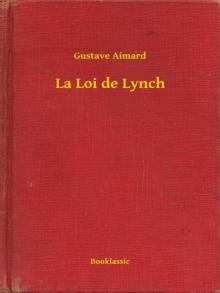 La loi de lynch. English
La loi de lynch. English The Guide of the Desert
The Guide of the Desert The Trail-Hunter: A Tale of the Far West
The Trail-Hunter: A Tale of the Far West The Pirates of the Prairies: Adventures in the American Desert
The Pirates of the Prairies: Adventures in the American Desert The Treasure of Pearls: A Romance of Adventures in California
The Treasure of Pearls: A Romance of Adventures in California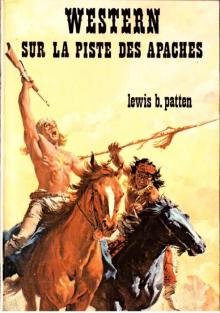 Les outlaws du Missouri. English
Les outlaws du Missouri. English Les trappeurs de l'Arkansas. English
Les trappeurs de l'Arkansas. English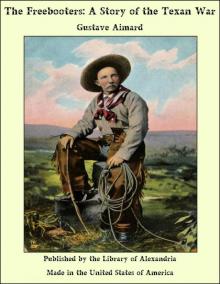 The Border Rifles: A Tale of the Texan War
The Border Rifles: A Tale of the Texan War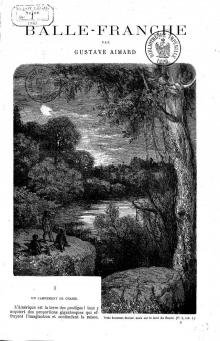 Balle-Franche. English
Balle-Franche. English The Queen of the Savannah: A Story of the Mexican War
The Queen of the Savannah: A Story of the Mexican War The Red Track: A Story of Social Life in Mexico
The Red Track: A Story of Social Life in Mexico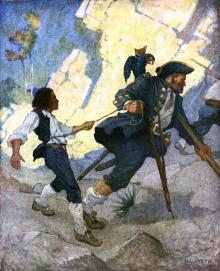 La fièvre d'or. English
La fièvre d'or. English The Pearl of the Andes: A Tale of Love and Adventure
The Pearl of the Andes: A Tale of Love and Adventure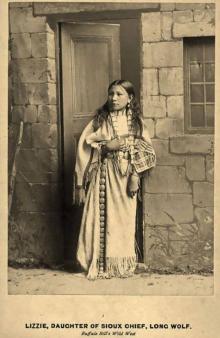 Les fils de la tortue. English
Les fils de la tortue. English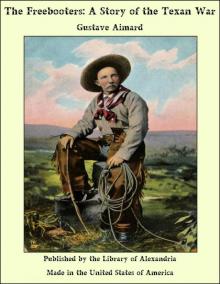 The Indian Chief: The Story of a Revolution
The Indian Chief: The Story of a Revolution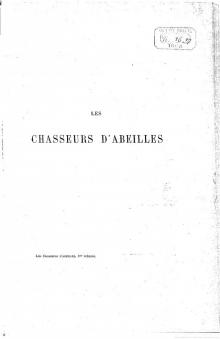 Les chasseurs d'abeilles. English
Les chasseurs d'abeilles. English The Adventurers
The Adventurers